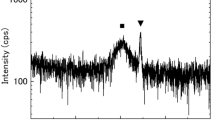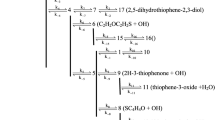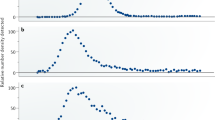Abstract
IT has been long known that the presence of diluent vapours in the reactants depresses the reaction velocity at a catalyst surface. The following quantitative treatment has been confirmed by experiments on the effect of water vapour on the initial stages of the dehydrogenation of alcohol by copper. Let p = the fractional partial pressure of the reactant A, hence 1 - p = the fractional partial pressure of the diluent B. Then the rate at which the reactant molecules arrive at the surface is proportional to, say. Thus the probability that a reactant molecule should bombard a given portion of a catalyst at a given instant is i.e. the fraction of A molecules in the impinging stream of A and B molecules. According to the conception of Langmuir and Frenkel, a molecule that hits another adsorbed molecule is immediately reflected, whereas when it strikes the bare surface it remains for the short period of time r. It is also known that chemical action occurs on definite centres on the catalyst surface.
This is a preview of subscription content, access via your institution
Access options
Subscribe to this journal
Receive 51 print issues and online access
$199.00 per year
only $3.90 per issue
Buy this article
- Purchase on Springer Link
- Instant access to full article PDF
Prices may be subject to local taxes which are calculated during checkout
Similar content being viewed by others
Author information
Authors and Affiliations
Rights and permissions
About this article
Cite this article
CONSTABLE, F. The Effect of Diluents on the Initial Stages of Catalytic Action. Nature 116, 278–279 (1925). https://doi.org/10.1038/116278b0
Published:
Issue Date:
DOI: https://doi.org/10.1038/116278b0
Comments
By submitting a comment you agree to abide by our Terms and Community Guidelines. If you find something abusive or that does not comply with our terms or guidelines please flag it as inappropriate.



